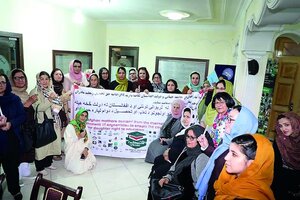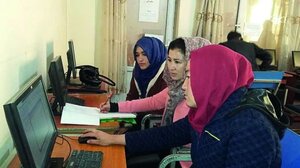Farkhunda Trust for Afghan Women's Education
The Farkhunda Trust was founded in the United Kingdom in memory of the brutally murdered Farkhunda Malikzadeh - in order to support Afghan women in pursuing higher education. In March 2015, 27-year old Farkhunda Malikzadeh had just completed a degree in religious studies and was working as a volunteer teacher at a Kabul mosque. During an argument with a mullah, he accused her of burning a copy of the Qur’an. Hearing the mullah’s accusation, an angry mob began to attack Farkhunda. She was beaten, her body driven over and set on fire while bystanders, including police, were watching. Graphic footage of her burning body went viral on social media, shocking Afghan society, government and women’s activists around the world. The anger over Farkhunda’s lynching quickly turned to grief and national shame for Afghanistan and for the government’s failure to prevent this horrific incident.
The Farkhunda Trust provides scholarships to women from disadvantaged backgrounds for tertiary education in Afghanistan and mentoring programs to female students. The trust aims to raise the profile of women in Afghan society by assisting female students to become socially and financially independent, as well to become entrepreneurs and political leaders.
Afghanistan is in immediate need of support

Initiatives to foster diaspora engagement – like the Farkunda Trust – could be an effective means to improve various sectors in Afghanistan such as food security, employment, women’s empowerment, education and health care.
10.23 million (33%) of Afghans live in severe food insecurity (IPC, 2019). Further, the healthcare system needs major support and funding; at present one physician has to treat 5,000 patients. There is a huge need for more doctors – especially female doctors.
The unemployment rate in Afghanistan is at 42% - almost half of them are youth (ILO, 2017). Lack of education, knowledge and skills is a challenge. In 2016, more than 550,000 Afghans (including 380,000 registered refugees) were forcibly repatriated from Pakistan; 70-80% of repatriated Afghans were unemployed. Women and girls are often the worst off because of the country’s socially conservative nature.
According to UNICEF’s 2019 report there are 3.7 million children between the ages of 7 and 17 out of school due to insecurity, and girls account for 60% of them. The situation has worsened again in the last years: 1,000 schools were closed between 2017 and 2018 due to insecurity. As a result, half a million children were denied their right to education.
Women in Afghanistan are particularly affected by violence
76% of Afghan women face some form of violence, Afghanistan is considered one of the worst places in the world for women to live (HRW, 2019). Abuse and harassment is affecting women in their everyday life, their social participation, the workplace and the education environment. The nature of invisible violence against women has still not been tackled adequately. For example, the Afghan police routinely refuses to register cases of female victims of domestic violence and ‘honour’ killing is still commonly practiced. Besides even stoning and life threats for women right activists are taking place (HRW, 2019).
In general, extensive progress has been made in the last two decades but that progress must be sustained and further developments made. It is up to us, the development actors, not only to protect what has been achieved, but to make long-term plans for further sustainable development leading to a peaceful Afghanistan. In particular there must be an increase in the number of women in leadership roles and in education. Their representation is a necessary driver of change and improvement, so that women have a better quality of life and access to labor and financial markets. Until this happens Afghanistan will remain one of the worst places in the world for women to live.
Challenges and Recommendations for Diaspora Engagement

Increased engagement of the Afghan Diaspora members in their host countries, and the development process in Afghanistan, is vital if challenges are to be overcome. Especially important is the work of an organization with a focus on supporting women in the country.
Selected challenges:
- The recognition and support for Diaspora charitable organizations by the international community is poor.
- The Afghan government has no clear policy and procedures to support and attract the Diaspora’s contribution from the humanitarian and economics field. Authorities are unwilling to meet and exchange with Diaspora activists. Further, there is a lack of recognition by some government employees of the Diaspora’s intellectual contribution; this is reflected in the low payment made to members of the Diaspora in comparison to that made to other national experts.
- Afghan female Diaspora organizations have no support in maintaining their core functions in terms of program management, finance or publicity. There is no strategic support for female Diaspora workers in the the field of development by embassies of Afghanistan due to the lack of expertise available in this field. Further, the employment of female Afghan Diaspora members by host country development and economic organizations is not adequately supported or their role is not acknowledged.
Selected recommendations:
- The Afghan Government should facilitate opportunities for increased Diaspora engagement and investment. Fast track investment procedures with better facilitation should be put in place for Diaspora members to start businesses in Afghanistan. Information about business establishment and all relevant procedural processes should be provided to Diaspora business owners by the Trade Secretaries of respective Afghanistan embassies.
- Conference and sharing forums between the Afghan Diaspora and other Diasporas at each host country level and the EU level should be set up.
- Short, medium and long-term programs should be designed to increase Diaspora engagement in the Afghanistan development process in their host country and the country of origin. Priority should be given to education, mentoring, economic empowerment and mental health counseling.
- A women’s higher education, leadership and mentoring program should be considered as one of the top priorities of development donors. Educational support for women should be through the support of women’s education in Afghanistan and in host countries through social integration, in order to increase women’s engagement as future leaders and effective contributors.

![[Translate to English:] © private [Translate to English:] © private](https://www.vidc.org/fileadmin/user_upload/rahela_sidiqi_600x350.jpg)